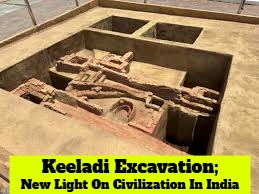

By Linus Garg
First publised on 2025-06-23 12:22:52
Nestled on the banks of the Vaigai River in Tamil Nadu, the archaeological site of Keeladi has transformed into a cultural flashpoint - where history meets identity, and excavation intersects with politics.
Discovered in 2015, Keeladi has yielded more than 18,000 artefacts including Tamil-Brahmi inscribed pottery, coins, gold ornaments, and terracotta pipes - evidence of a highly urbanized, literate society dating as far back as 580 BCE. These findings challenge the long-held narrative that ancient Indian civilization thrived only along the Gangetic plains.
Yet the excitement of this historical revelation has been tempered by controversy. The early phases of the excavation were led by archaeologist K. Amarnath Ramakrishna, whose work was widely praised. But in 2017, he was abruptly transferred from the project, a move many interpreted as a politically motivated attempt to stall further discoveries.
The tension deepened in 2025 when the Archaeological Survey of India (ASI) rejected Ramakrishnaâs nearly 1,000-page final report, asking for a resubmission. Critics, especially from Tamil Nadu's ruling DMK, alleged that the Centre was deliberately suppressing evidence of Tamil antiquity to maintain a North-centric version of history. The ASI, for its part, cited "technical gaps" in the report.
Amid this tug-of-war, Tamil Nadu has pressed ahead. The state allocated â¹7 crore for continued research, built a Keeladi museum in 2023, and has committed to telling the story of the Sangam-era Tamils - a people who were evidently literate, urban, and globally connected centuries before common assumptions.
But the Keeladi saga is more than a clash of dates and data. It touches on the broader questions of who controls history and whose stories are told. For many in Tamil Nadu, Keeladi is not just an archaeological site - it's a symbol of pride, self-respect, and civilizational dignity.
As the digs continue and the dust settles, the evidence beneath the soil must be allowed to speak louder than the politics above it.











